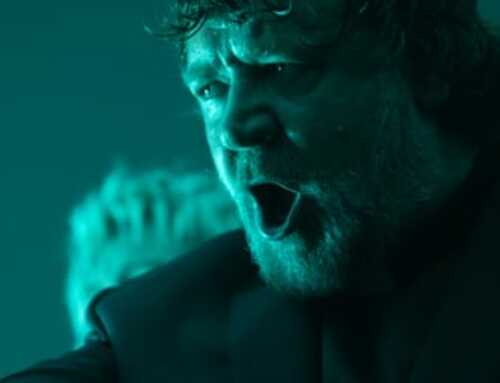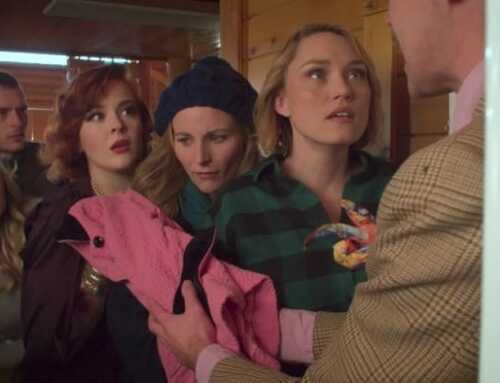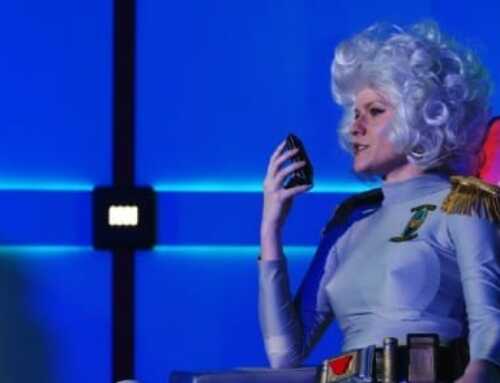 In 2047, people spend all of their time inside virtual worlds. When terrorists threaten the virtual world, a hybrid seeking revenge is hired to eliminate them before they can take down the system.
In 2047, people spend all of their time inside virtual worlds. When terrorists threaten the virtual world, a hybrid seeking revenge is hired to eliminate them before they can take down the system.
The year is 2047. Cars can fly and computer screens are finally that transparent blue that we’ve all dreamt of, but all of that of that pales in comparison to the greatest change affecting mankind: the retreat from reality into worlds of limitless possibility. The revolution came, just not the way we imagined. Virtual Revolution, written, directed, produced, and composed by Guy-Roger Duvert transports us to this possible eventuality, which feels closer than ever with the emergence of consumer virtual reality and the imminent release of Steven Spielberg’s film adaption of Ernest Cline’s Ready Player One. Far from a cheap imitation seeking to cash in on confused audiences like so many Paranormal Recreations and counterfeit Exorcists, Virtual Revolution presents an engaging and visually astounding experience that manages to succeed on pure craftsmanship even while its narrative fails to deliver anything fresh or unexpected.
Set in France, which despite being only 30 years removed from modern times has been transformed into a dimly patinated cyberpunk dystopia, a staggering metropolis rising above the clouds standing in stark contrast to the timeless beauty of its repurposed cathedrals and chateaus, left eerily vacant by a world that has long since abandoned the harsh realities of the outside world to inhabit a myriad of alternative realities which have been crafted to fulfill their every fantasy. We follow Nash (Mike Dopud), a gun for hire and hybrid (a term used to describe someone that uses VR technology but also ventures out into the real world), who finds himself employed by one of the few mega-corporations that manage these virtual worlds as he is tasked to stop a group of necromancers, hacker anarchists who use malicious code to kill those connected to their program. Along the way he is aided by his contact within the corporation, Dina (Jane Badler), and Morel (Maximilien Poullein), a hacker who offers his skills in data gathering and espionage in exchange for rare and valuable technology against the necromancers and Interpol, who represent the government in its efforts to squelch awareness of the dangers of VR to keep the people in a state of self-induced docility.
This interplay of morally ambiguous, self-interested actors vying to manipulate society to satisfy their own convictions as to what constitutes the greater good, awareness of the decay of social norms and human interaction versus the agency to take this newfound freedom and remake reality in our image sets the stage for a contronting philosophical debate, if not one we’ve seen before in films like The Matrix. Virtual Revolution squanders much of this opportunity, opting to present a fairly linear and mundane plot and only stopping to consider the implications of the world it has crafted in any depth during the film’s climax. This problem is only exacerbated by some underwhelming acting and characterization. There is nothing particularly insufferable here, Nash is your standard no-frills action hero, gruff and detached, ostensibly only compelled by money but granted some humanity through instances of doubt and vulnerability. What he lacks, however, is a compelling motivation to give the audience cause to want to see him succeed. The film ultimately gets there, but only through exposition which is delivered far enough into the film that it feels like it’s struggling to add the pieces to give the narrative depth just as it’s wrapping up. The sin of showing and not telling is a problem throughout, with the use of frequent narration being employed to explain Nash’s thoughts and emotions when a more nuanced direction could have conveyed these things non-verbally. There is also not much in the way of a strong supporting cast, with Morel being the only other character receiving any significant screen time. I was initially put off by this performance, with the French-born Poullein delivering his early lines with a stilted and unnatural delivery that seems to be a confused mishmash of at least 3 different accents at any given time, but he does with time find his footing and assuming you can see past this quirk he portrays Morel with a sort of befuddled paranoia that manages to carry a certain charm.
It is fortunate, then, that none of this is all that detrimental to the viewing experience, depending on what you’re expecting to get out of it. Despite the shallowness of its narrative, Virtual Revolution is a feast for the senses, a striking tapestry that engages the viewer through its audio and visuals via a meticulously-crafted patchwork of divergent landscapes, with distinct textures and motifs that keep the pacing exciting even as the plot plods along predictably. The city itself is a sort of Neo-Renaissance Blade Runner, a hyper-developed metropolis with massive animated billboards and cars soaring above the clouds, utilizing the narrow streets to showcase effervescent black markets teaming with shady dealers trading their wares among the glare of neon lights to the monumental chateaus that lay in disrepair, abandoned by a society that no longer has any need for the comforts of the material world, a void filled by squatters and miscreants. The virtual environments are just as compelling, offering visions of high fantasy, swords and sorcery, and remote Arabian villages with skies full of dragons and airships. Each new world brings with it its own artistic flair, featuring a combination of fine costuming with a blend of practical and high-quality CG effects work that is consistently convincing. The cinematography isn’t exceptionally daring, but there is some attractive composition and the fight choreography strikes a balance between gritty viscerality and a more kinetic martial arts approach which is supported by strong camera work and editing that keeps the action sensible and easy to follow. The music is similarly evocative, from the cold electronic ambience of the city to the sweeping orchestral themes of its fantasy scenes and the lyre-centric strings of the middle east, the score deftly blends in with supports the visual experience.
Virtual Revolution’s story is nothing special. It’s characters get the job done but offer little in the way of nuance or emotional depth to get us to care about their struggles and aspirations, but if James Cameron’s Avatar can get away with having the shallowness of a kiddie pool after a particularly thunderous cannonball, I see no reason to not extend the same courtesy to this film which accomplishes so much with many fewer resources. Not all films are designed to make you think, and while there are efforts made in the film’s closing moments to give its philosophical ponderings more gravity, it is at its core an incredibly polished bit of mindless sci-fi action and that’s okay. Virtual Revolution may not leave much of a lasting impact, but it presents a dazzling spectacle and made me pine for a day when I too can disconnect from this dismal meatspace and venture out into infinite worlds of infinite potential. If the future promised here is what we can hope for as we venture forth into this brave new world of alternate realities, then long live the revolution.
| Virtual Revolution | ||
| RATING: | NR | 2047 : Virtual Revolution - Trailer |
| Runtime: | 1hr. 32Mins. | |
| Directed By: | ||
| Written By: | ||









